Tile Installation Cost Guide in New Hampshire and Massachusetts
In New Hampshire and Massachusetts, tile installation typically averages around $2,600 in 2025 for a standard 100-square-foot project. Costs can range from $600 for economical options to over $10,000 for luxury designs and custom work. This guide breaks down what influences these costs and how to plan your project effectively.
In this article:
Average cost
Average cost of tile installation in NH & MA
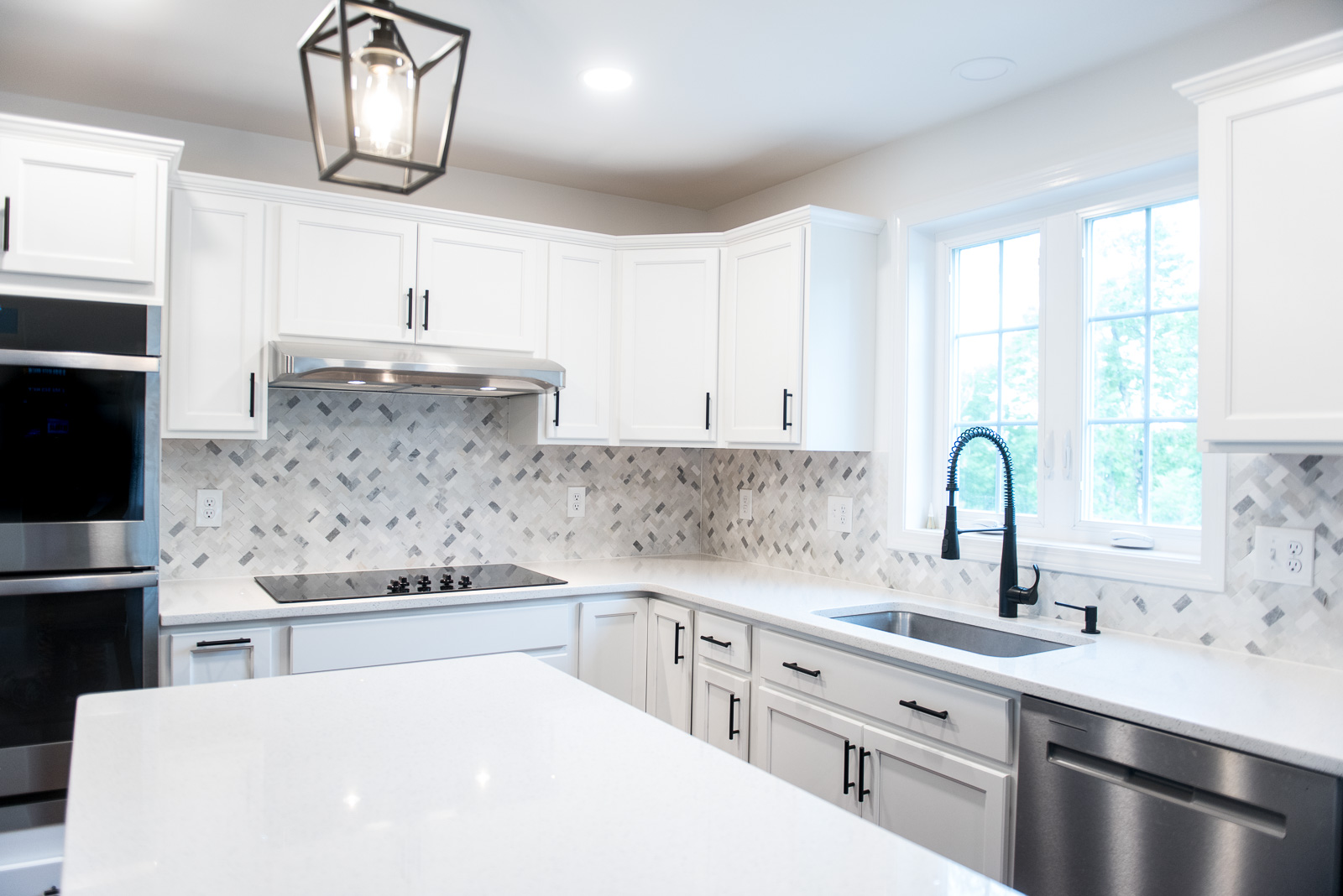
Tile installation costs depend on material, room size, and design complexity. For most homeowners in NH and MA, the average cost is $2,600, covering both materials and labor for a 100-square-foot project.
For smaller, simpler installations, like a 25-square-foot wall section, costs can start as low as $600. Conversely, high-end custom designs for large areas or intricate patterns can exceed $10,000, depending on tile type and installation difficulty.
| Average Cost to Install Tile in NH & MA | |
|---|---|
| Average | $2,600 (100 sq. ft.) |
| Low End | $600 (25 sq. ft.) |
| High End | $10,000+ (Custom large areas) |
When buying tile, always add an extra 10% for breakage and cutting waste.
Cost calculator
Tile Installation Cost Calculator
Note: This is a rough starting point based on typical projects. Final costs vary due to site conditions, custom details, and more. For a formal quote, click the button below!
Estimated Cost
| Item | Low Estimate | High Estimate |
|---|---|---|
| Tile Cost (Materials) | ||
| Contractor Labor Cost | ||
| Additional Services | ||
| Total Cost |
Cost breakdown
What influences tile installation cost?
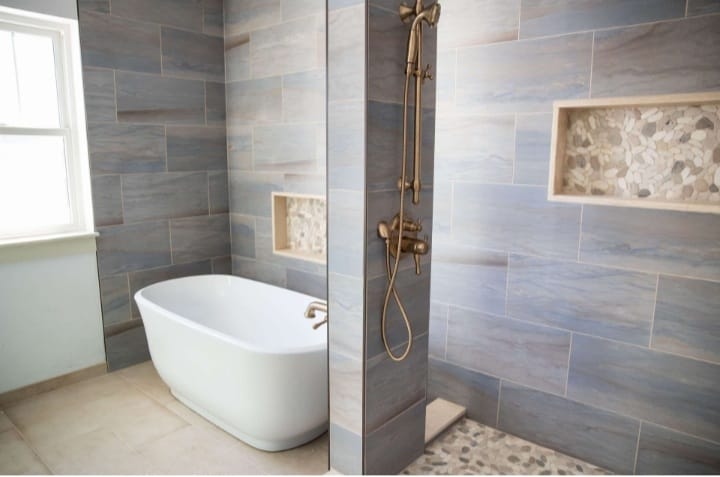
The cost of tile installation goes beyond just the price of the tiles themselves. Several factors can impact the overall cost, including the type of material, labor involved, subfloor preparation, and the complexity of the design.
| Factor | Description |
|---|---|
| Tile Material | The type of tile you choose (e.g., ceramic, marble, porcelain) impacts both material costs and installation complexity. |
| Labor | Skilled labor is essential, and costs can vary based on the complexity of the installation, such as intricate patterns or custom layouts. |
| Floor Prep & Subfloor | If your subfloor requires leveling or repair, additional prep work can increase the overall cost of installation. |
| Design Complexity | More intricate designs (like mosaics or diagonal patterns) will require additional time, materials, and labor, raising the cost. |
| Additional Costs | Grouting, sealing, and edge trimming (e.g., bullnose) are additional costs to consider for a finished look. |
| Geographic Location | Big cities tend to have higher costs, while rural areas may face additional shipping fees for materials. |
Be sure to discuss all aspects of the job with your contractor, including subfloor prep, design details, and any additional work like grouting or trim installation. This will help you get a clear picture of the full costs upfront and avoid surprises later.
Cost by area size
Tile installation cost by area size in NH & MA
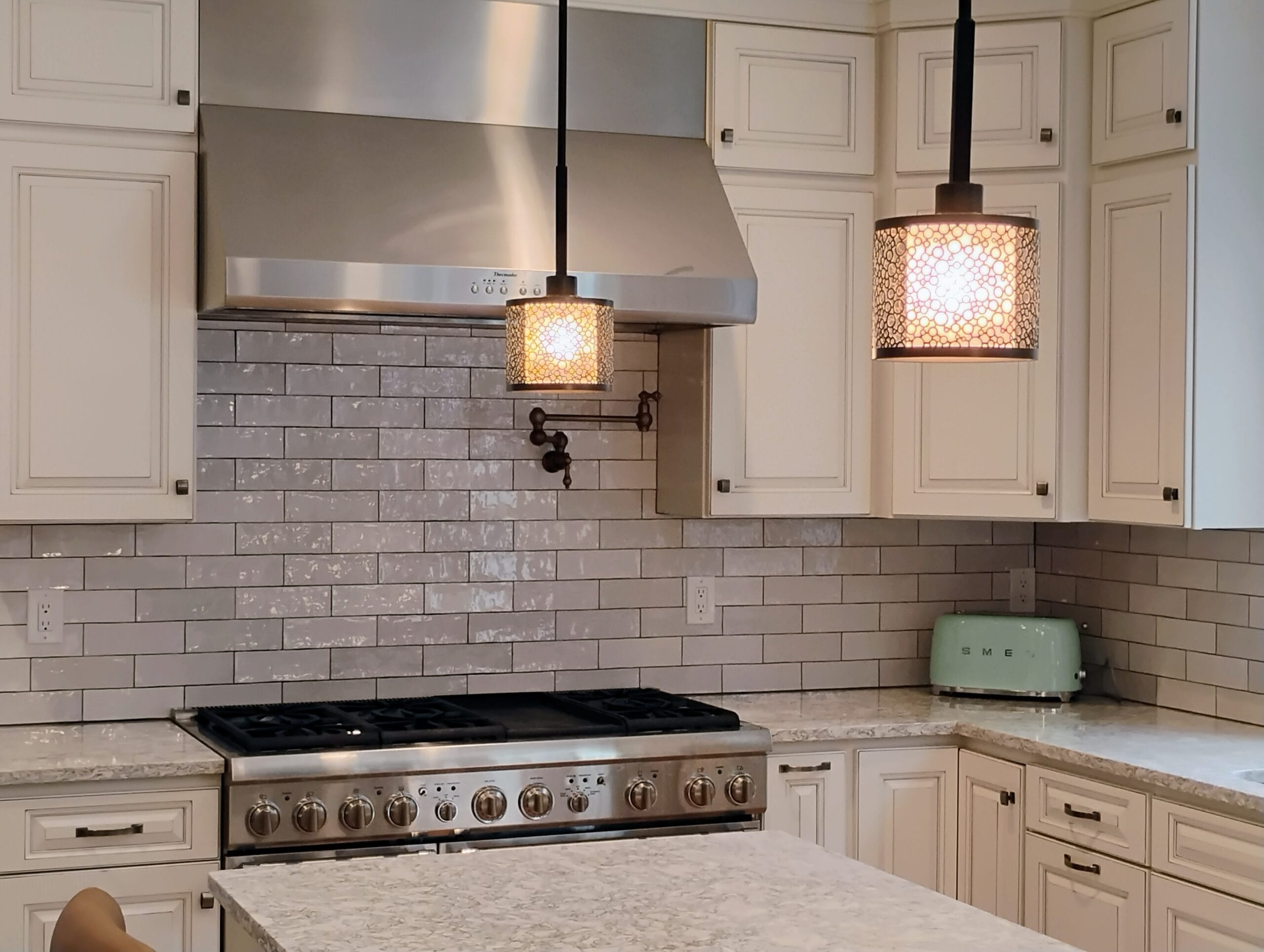
Tile installation cost can vary significantly depending on the size of the area you’re working with. Smaller projects, such as backsplashes, tend to be more affordable, while larger rooms or extensive areas, like open-concept spaces or full floors, can require a larger investment.
| Project Size | Estimated Cost | Description |
|---|---|---|
| Small (25-50 sq. ft.) | $800 - $2,200 | Small areas like bathrooms or backsplash. |
| Medium (100 sq. ft.) | $1,800 - $3,400 | Typical for medium-sized rooms, like kitchens or large bathrooms. |
| Large (200+ sq. ft.) | $4,000 - $7,000 | Larger spaces like open-concept kitchens or large living areas. |
| Extra Large (500+ sq. ft.) | $8,000 - $15,000+ | Extensive areas, like whole floors or commercial spaces. |
Flooring Area Calculator
How to Calculate
- Measure your room in rectangular sections.
- Enter your measurements below.

Step 1: Enter Width and Length of Section(s):
Step 2: Enter Waste Percentage:
For larger projects, consider doing the installation in stages to spread out costs. This allows you to prioritize the most important areas first and gives you time to adjust your budget accordingly.
Cost by tile size
Tile installation cost by tile size in NH & MA
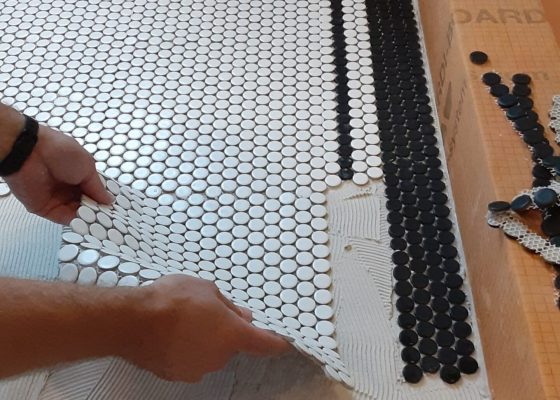
Tile size affects not only the look but also the installation labor. Smaller tiles take longer due to the number of cuts and grout lines, while larger tiles require a flatter surface and extra precision. Here’s a breakdown based on common tile sizes:
| Tile Size | Estimated Cost | Details |
|---|---|---|
| Mosaic (1x1", Hex, Penny Round) | $14 – $22 per sq ft | Tiny tiles on mesh sheets. Labor-intensive with lots of grout lines. Perfect for shower floors, niches, and accents. |
| Small Format (3x6", 4x4", 6x6") | $8 – $14 per sq ft | Popular in backsplashes and bathrooms. More cuts and spacing work. Subway tile is a common example. |
| Standard (12x12", 12x24") | $6 – $10 per sq ft | Most common for floors and walls. Balanced time and material use. Good for kitchens, baths, and hallways. |
| Large Format (24x24", 24x48"+) | $10 – $18 per sq ft | Modern look, fewer grout lines. Requires a level surface. Ideal for open areas and luxury bathrooms. |
Larger tiles may seem faster to install, but they require a perfectly level surface — otherwise, you'll see uneven edges or "lippage." On the other hand, small tiles like mosaics look great in tight spaces but take longer due to extra grouting and alignment. Always choose tile size based on both the space and the surface condition — not just style!
Cost by project
Cost by tile project type in NH & MA
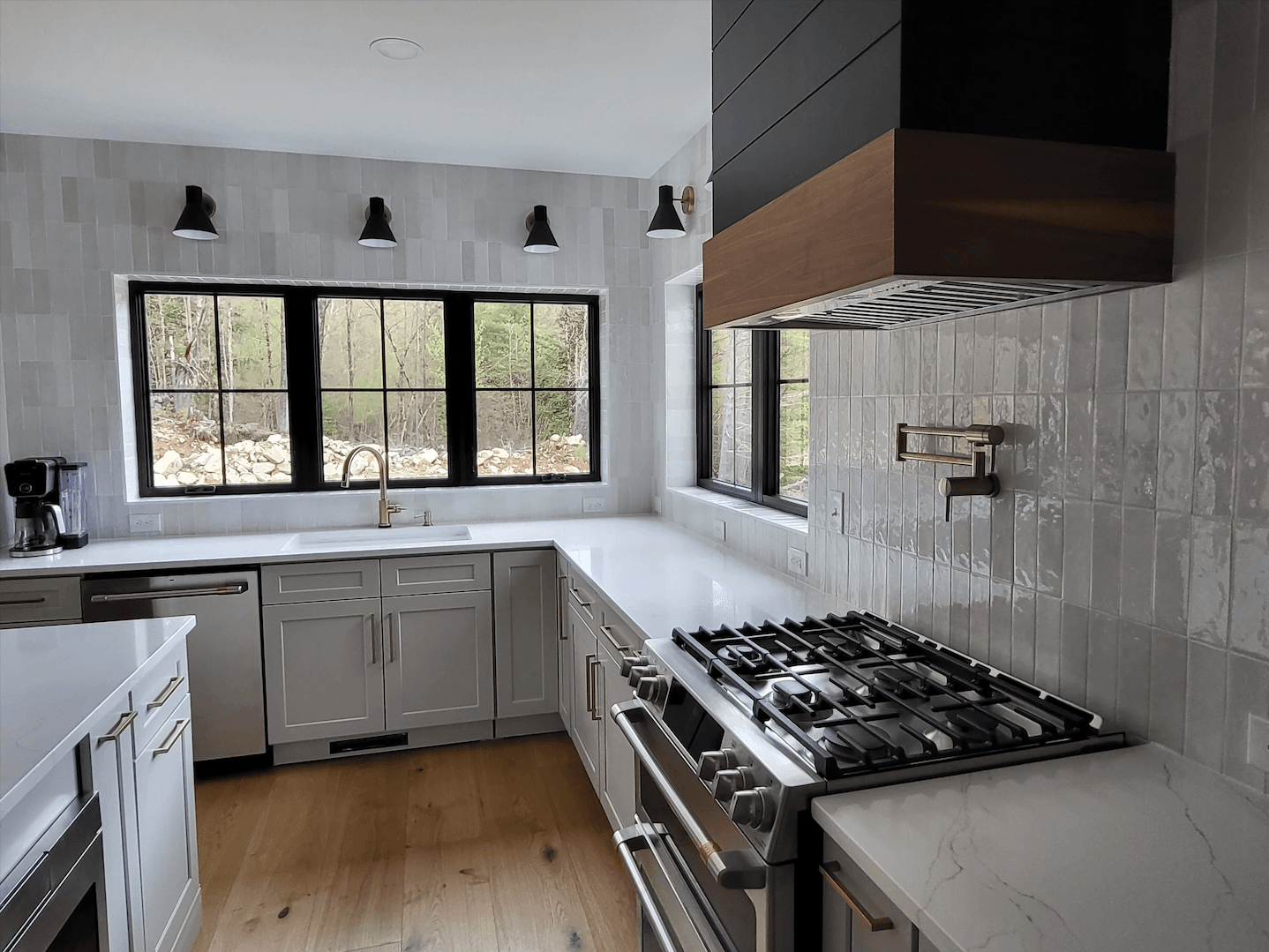
Tile installation cost can vary by location in the home. High-traffic areas like kitchens or bathrooms tend to cost more due to durability needs, while complex areas like fireplaces or accent walls may require higher-end materials, increasing the price.
| Project Type | Low-End Cost | Mid-Range Cost | High-End Cost | Description |
|---|---|---|---|---|
| Backsplash | $700 | $1,800 | $2,000 | Subway tile or other ceramic options. Marble increases the cost. |
| Flooring (Small Kitchen) | $1,200 | $2,500 | $3,900 | Small kitchens, depending on materials and layout. |
| Flooring (Large Kitchen) | $1,600 | $3,000 | $4,200 | Larger kitchen spaces, with more complex flooring patterns. |
| Heated Floors | $2,100 | $3,200 | $4,500 | For electric heating systems in a 100 sqft space. |
| Bathroom Walls (Tub Area) | $900 | $2,500 | $3,000 | Tiled walls for a bathtub or shower area with glazed ceramic tile. |
| Bathroom Walls (Walk-in Shower) | $1,200 | $2,500 | $2,900 | Cost varies depending on tile choice and shower design. |
| Fireplace | $1,200 | $3,000 | $6,500 | Tile around the fireplace with high-end materials like stone and intricate patterns. |
Complex designs, premium materials like marble or stone, and floor prep (like heating or leveling) can significantly raise the price. Always get a detailed estimate to understand the full scope of costs for your project.
Cost by material
Overview of common materials and their typical costs
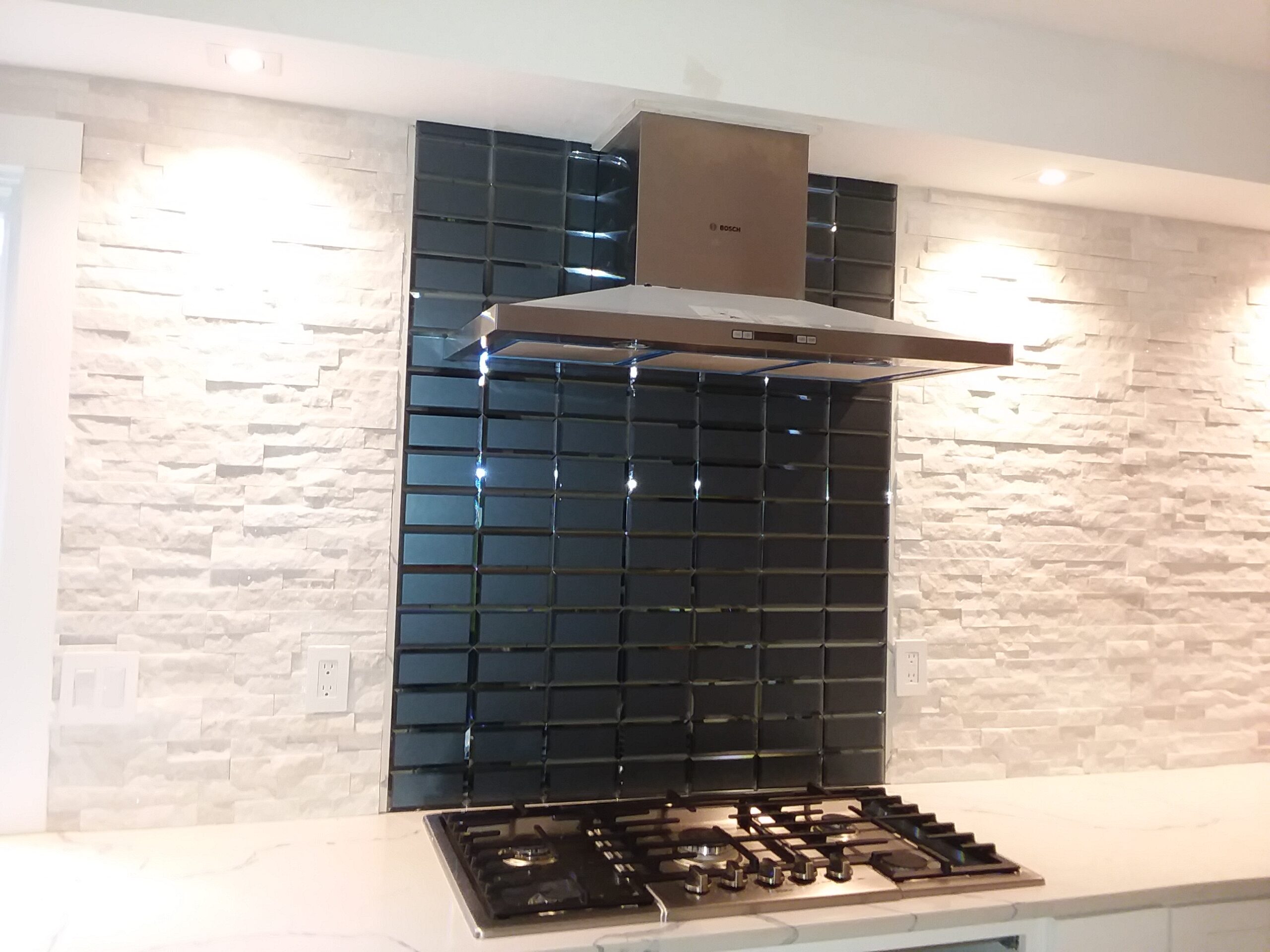
| Tile Type | Description | Cost Range / 100 sqft |
|---|---|---|
| Ceramic | Affordable, versatile, ideal for floors, backsplashes, and walls. | $600 - $2,500 |
| Porcelain | Durable, water-resistant, great for bathrooms and floors. | $800 - $3,000 |
| Marble | Luxurious, high-end, perfect for accents and floors, but requires professional installation. | $1,500 - $6,500 |
| Glass | Ideal for backsplashes, easy to clean, but more fragile. | $900 - $4,000 |
| Natural Stone | Includes slate, limestone, and travertine, offering unique textures and colors. | $1,200 - $5,000 |
| Cement | Durable and customizable, often used for outdoor spaces and industrial designs. | $1,000 - $3,500 |
While marble and natural stone offer luxurious looks, they may require more maintenance compared to more affordable and durable options like ceramic or porcelain.
Cost by design
Common tile designs and their costs
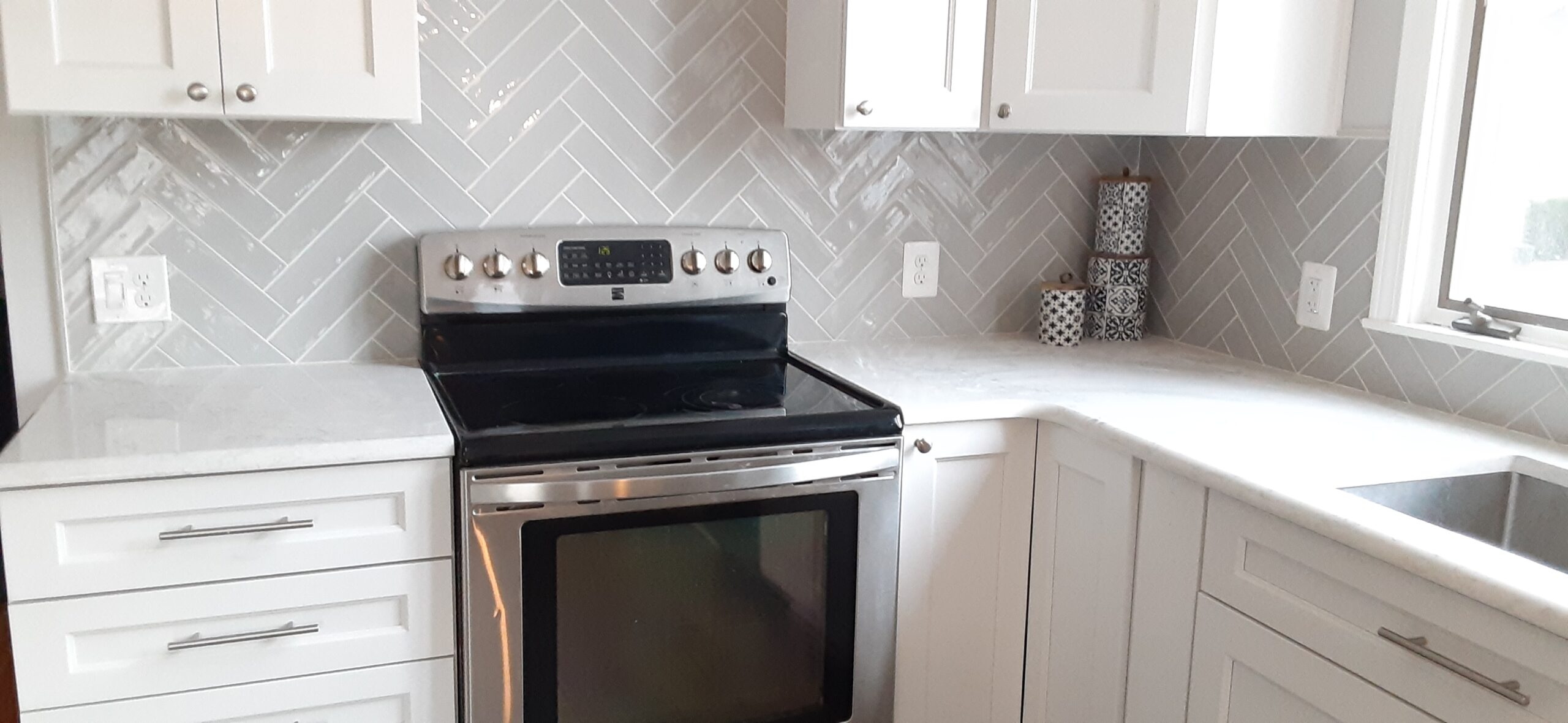
| Design Type | Description | Cost Range / 100 sqft |
|---|---|---|
| Simple Grid | Classic and straightforward layout using square or rectangular tiles. | $600 - $1,800 |
| Herringbone | Stylish V-shaped pattern that adds visual interest to any space. | $900 - $2,500 |
| Diagonal | Tiles laid at a 45-degree angle to create a dynamic, modern look. | $700 - $2,200 |
| Mosaic | Small tiles arranged in detailed patterns or images. | $1,200 - $4,000 |
| Custom Layout | Unique designs tailored to your space, often combining different tile shapes and patterns. | $1,500 - $5,500 |
| Checkerboard | Contrasting tiles arranged in a bold alternating pattern. | $800 - $2,500 |
More intricate designs like herringbone can make a dramatic impact, but keep in mind that these designs require more labor, which can increase the overall cost.
Labor costs
Cost for hiring a professional
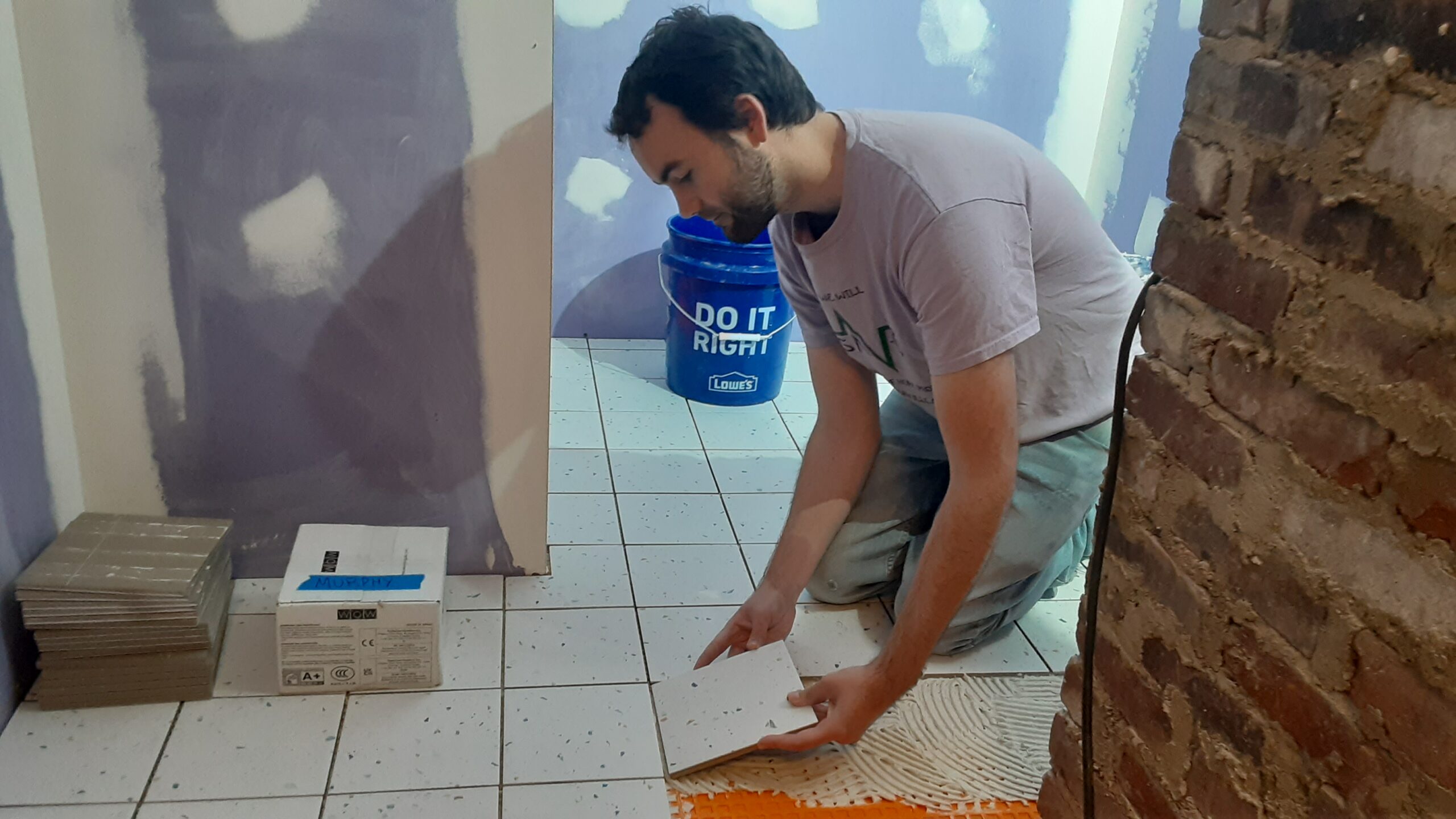
The complexity of the job, the size and type of material, as well as the time required to complete the project all contribute to labor costs.
| Labor Type | Cost Range /100 sqft | Description |
|---|---|---|
| Standard Installation | $1,200–$1,800 | Basic installation for common tile types like ceramic and porcelain. |
| Intricate Designs | $1,600–$2,800 | Work involving detailed patterns, mosaic tiles, or custom layouts. |
| Floor Prep | $800–$1,400 | Preparing subfloor for installation, including leveling or smoothing. |
| Demolition | $1,100–$1,700 | Removing old tiles, cleaning debris, and preparing the area for new tiles. |
Labor costs can vary significantly based on your geographical location. Ensure that your contractor provides an itemized estimate to cover all aspects of the installation.
Professional installation vs. DIY
When deciding between professional installation and DIY for your tile project, it’s essential to weigh the benefits and challenges of each option.
| Option | Cost Range/100 sqft | Pros | Cons |
|---|---|---|---|
| Professional Installation | $1,200 - $2,800+ | High-quality results, saves time, expertise in handling complex designs, proper floor prep and demolition, warranty. | Higher upfront cost, scheduling may be required, no control over timing. |
| DIY Installation | $600 - $1,400 | Lower cost, control over design, hands-on experience, no need for scheduling or contractors. | Time-consuming, requires tools and skills, risk of mistakes, may lack expertise in floor prep and demo. |
While DIY installation may seem like a more affordable option, remember that improper installation can lead to additional repairs in the future, potentially increasing your costs. For a flawless finish, especially for complex designs, professional installation might be a safer bet.
Additional costs
Several additional factors that can impact the price
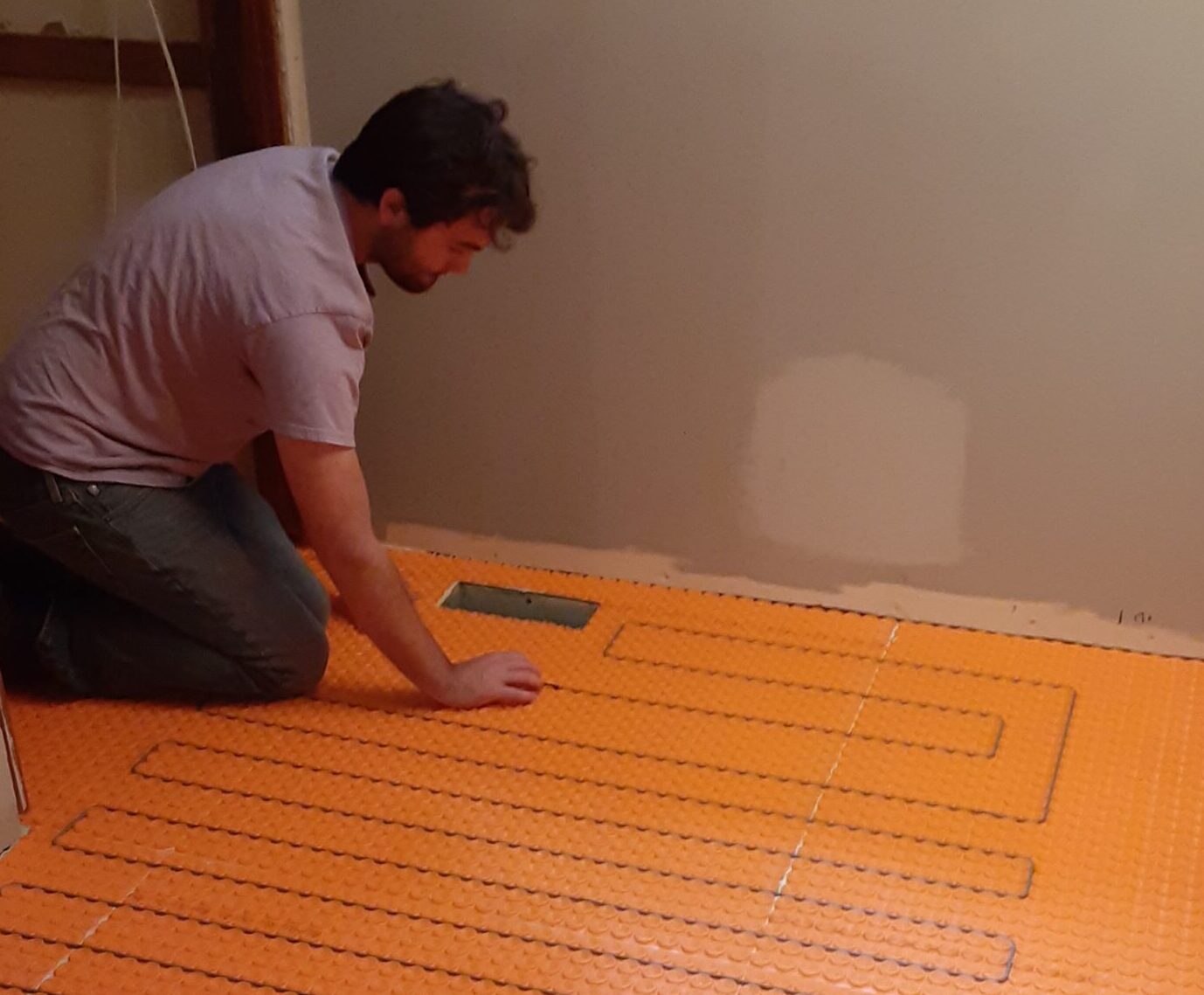
Tile installation costs go beyond just the tiles themselves. Additional factors, like floor prep, plumbing work for showers, or heating systems, can affect your final price.
| Additional Cost | Cost Range/100 sqft | Description |
|---|---|---|
| Floor Preparation | $800 - $1,400 | Cost for leveling the subfloor or repairing any damage to ensure proper tile adhesion. |
| Old Tile Removal | $200 - $1,500 | Removing old tile or flooring before the new installation can be time-consuming and costly. |
| Heated Floors | $500 - $2,500 | Electric heating systems installed beneath the tile for additional comfort and luxury. |
| Tile Sealing | $100 - $300 | Sealing grout and tiles to protect against moisture and stains, especially in high-moisture areas. |
| Plumbing for Showers | $900 - $3,500 | Cost for rerouting plumbing and installing fixtures for new shower setups, depending on complexity. |
| Schluter Membrane Installation | $600 - $900 | Membrane used for waterproofing floors or walls, especially for wet areas like showers, protecting against water damage. |
Always plan ahead for extra costs like floor prep and plumbing. These can add up quickly, so it’s best to discuss them early with your installer to avoid surprises.
Timeline
How long does a tile project take?
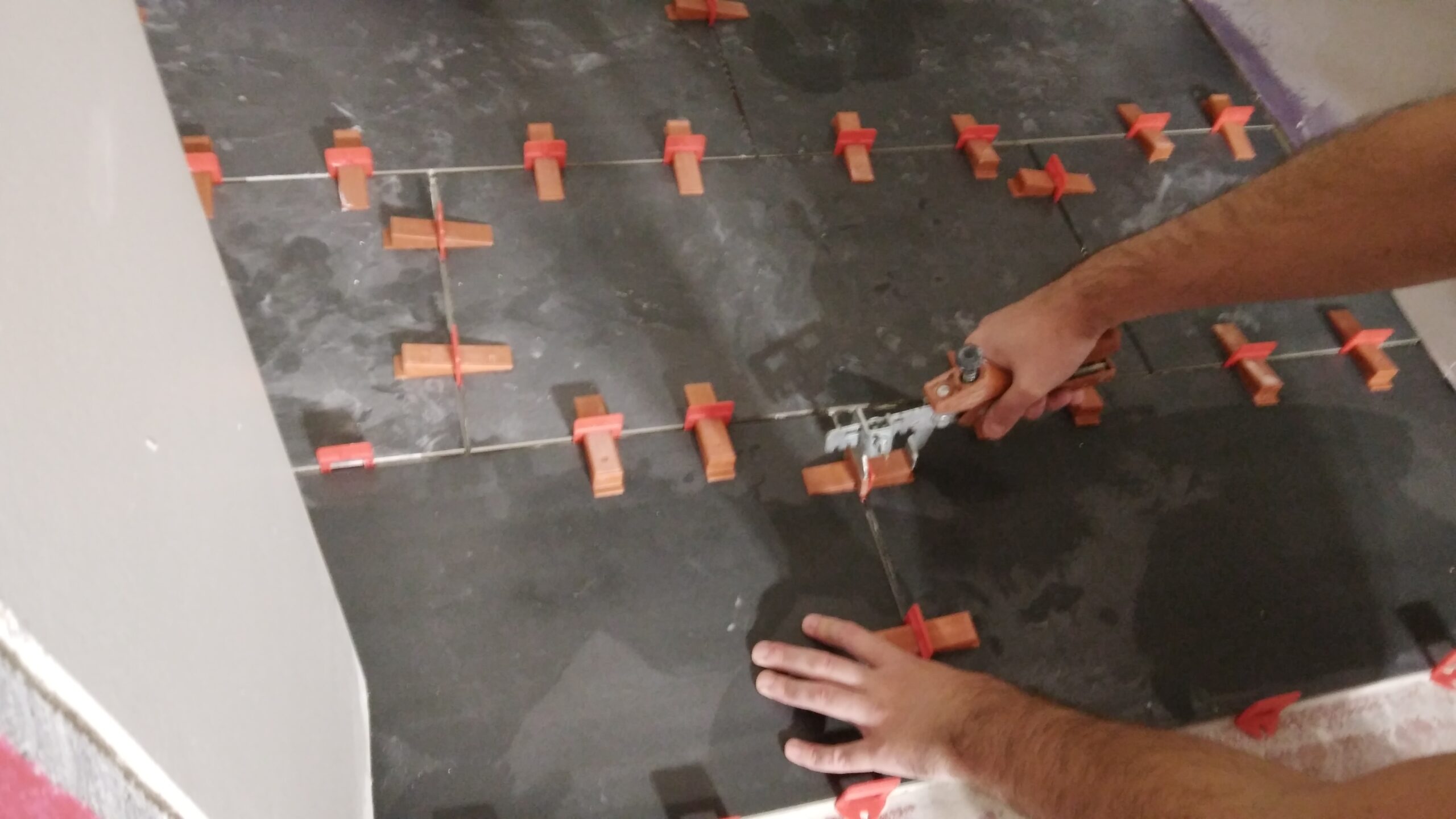
| Step | Duration (100-200 sqft) | Details |
|---|---|---|
| Consultation & Estimation | 1-3 days | Discuss your project needs, preferences, and get a detailed estimate. |
| Material Selection | 1-5 days | Choose the tile materials and finishes for your project. |
| Preparation & Setup | 1-2 days | Prepare the space, including floor leveling and surface cleaning. |
| Tile Installation | 2-5 days | Lay down tiles, ensuring proper alignment and cutting. |
| Grouting & Finishing | 1-2 days | Fill grout lines, clean up excess grout, and finalize the tile finish. |
| Final Walkthrough | 1 day | Review the completed installation and address any concerns. |
Be mindful of the drying time for adhesives and grout between installation steps to ensure optimal results. Rushing the process can lead to uneven surfaces or improper bonding, impacting the durability of your tiles. Patience ensures long-lasting beauty.
Ways to save
How to keep your tile installation on budget?
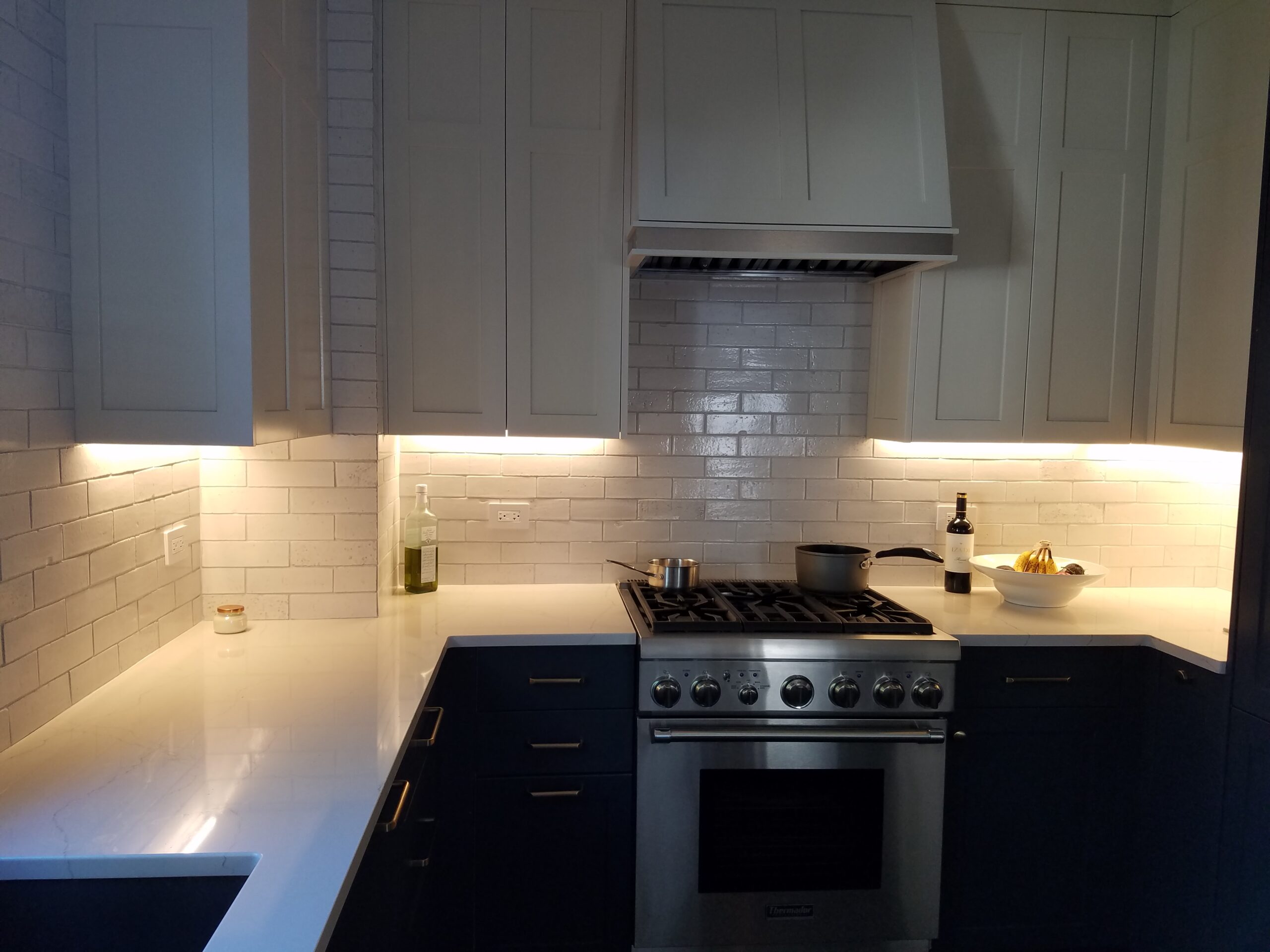
| Tip | How It Saves |
|---|---|
| Avoid Hiring a Designer | By creating your own design using online tools, you save the cost of hiring a designer while still getting a customized look. |
| Do Some Prep Work | If you can handle demolition or subfloor preparation, you can lower the overall labor costs. |
| Hire a Licensed Plumber Directly | For plumbing-related work, hire a licensed plumber yourself instead of paying through your contractor, which can save on markup fees. |
| Use Classic Ceramic Tile | Classic ceramic tiles are affordable, durable, and easy to install, making them a cost-effective choice compared to pricier materials like marble. |
| Use Simple Grout Lines | Opt for simpler grout lines (like straight or grid patterns) rather than intricate designs, which require more labor and time to install. |
| Avoid Large Format Tiles | Large-format tiles not only cost more per tile but also require more precise installation and more labor, driving up costs. |
Take the time to prepare the space yourself by removing old tile or flooring. Not only will it save money, but it also gives you more control over the project timeline and reduces labor costs.
Tile pros near you
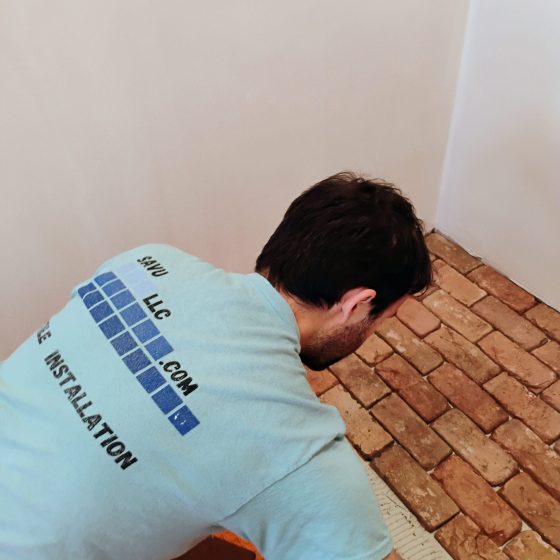
Find trusted tile installers near you.
Tile installers in New Hampshire
- Acworth
- Allenstown
- Alstead
- Alton
- Alton Bay
- Amherst
- Andover
- Antrim
- Ashland
- Atkinson
- Auburn
- Barnstead
- Barrington
- Bedford
- Belmont
- Bennington
- Boscawen
- Bow
- Bradford
- Brentwood
- Bristol
- Brookline
- Candia
- Canterbury
- Center Harbor
- Charlestown
- Chester
- Chichester
- Claremont
- Concord
- Contoocook
- Cornish
- Croydon
- Danbury
- Danville
- Deerfield
- Deering
- Derry
- Dover
- Dublin
- Dunbarton
- Durham
- East Kingston
- Enfield
- Epping
- Epsom
- Exeter
- Farmington
- Fitzwilliam
- Francestown
- Franklin
- Fremont
- Georges Mills
- Gilford
- Gilmanton
- Gilsum
- Goffstown
- Goshen
- Grafton
- Grantham
- Greenfield
- Greenland
- Greenville
- Hampstead
- Hampton
- Hampton Falls
- Hancock
- Hanover
- Harrisville
- Hebron
- Henniker
- Hill
- Hillsborough
- Holderness
- Hollis
- Hooksett
- Hopkinton
- Hudson
- Jaffrey
- Keene
- Kensington
- Kingston
- Laconia
- Lee
- Lebanon
- Lempster
- Litchfield
- Londonderry
- Loudon
- Lyndeborough
- Madbury
- Manchester
- Marlborough
- Marlow
- Mason
- Meredith
- Merrimack
- Middleton
- Milford
- Milton
- Mirror Lake
- Mont Vernon
- Moultonborough
- Nashua
- Nelson
- New Boston
- New Castle
- New Durham
- New Hampton
- New Ipswich
- New London
- Newbury
- Newfields
- Newington
- Newmarket
- Newport
- Newton
- North Hampton
- Northfield
- Northwood
- Nottingham
- Ossipee
- Pelham
- Pembroke
- Peterborough
- Pittsfield
- Plainfield
- Plaistow
- Plymouth
- Portsmouth
- Raymond
- Rindge
- Rochester
- Rollinsford
- Rye
- Salem
- Salisbury
- Sanbornton
- Sandown
- Seabrook
- Sharon
- Somersworth
- South Hampton
- Spofford
- Springfield
- Stoddard
- Strafford
- Stratham
- Sullivan
- Sunapee
- Suncook
- Sutton
- Swanzey
- Temple
- Tilton
- Troy
- Wakefield
- Walpole
- Warner
- Washington
- Weare
- Webster
- Wilmot
- Wilton
- Winchester
- Windham
- Wolfeboro
Tile installers in Massachusetts
- Acton
- Allston
- Amesbury
- Andover
- Arlington
- Ashburnham
- Ashby
- Ashland
- Ayer
- Baldwinville
- Bedford
- Belmont
- Berlin
- Beverly
- Billerica
- Bolton
- Boston
- Boxborough
- Boxford
- Braintree
- Brighton
- Brookline
- Burlington
- Byfield
- Cambridge
- Carlisle
- Charlestown
- Chelmsford
- Chelsea
- Clinton
- Cohasset
- Concord
- Danvers
- Dedham
- Devens
- Dorchester
- Dover
- Dracut
- Dunstable
- East Boston
- Essex
- Everett
- Fitchburg
- Framingham
- Gardner
- Georgetown
- Gloucester
- Groton
- Groveland
- Hamilton
- Hanover
- Harvard
- Haverhill
- Hingham
- Holbrook
- Holliston
- Hopkinton
- Hubbardston
- Hudson
- Hyde Park
- Ipswich
- Jamaica Plain
- Lancaster
- Lawrence
- Leominster
- Lexington
- Lincoln
- Littleton
- Lowell
- Lunenburg
- Lynn
- Lynnfield
- Malden
- Manchester-by-the-Sea
- Marblehead
- Marlborough
- Mattapan
- Maynard
- Medford
- Melrose
- Merrimac
- Methuen
- Middleton
- Milton
- Mission Hill
- Nahant
- Natick
- Needham
- Newbury
- Newburyport
- Newton
- Newton Centre
- Newton Highlands
- Newton Lower Falls
- Newton Upper Falls
- Newtonville
- North Andover
- North Billerica
- North Chelmsford
- North Reading
- Norwell
- Norwood
- Peabody
- Pepperell
- Princeton
- Quincy
- Randolph
- Reading
- Revere
- Rockport
- Roslindale
- Rowley
- Roxbury
- Royalston
- Salem
- Salisbury
- Saugus
- Scituate
- Sherborn
- Shirley
- Somerville
- South Boston
- Sterling
- Stoneham
- Stow
- Sudbury
- Swampscott
- Templeton
- Tewksbury
- Topsfield
- Townsend
- Tyngsborough
- Waban
- Wakefield
- Waltham
- Watertown
- Wayland
- Wellesley
- Wenham
- West Newbury
- West Roxbury
- Westford
- Westminster
- Weston
- Westwood
- Weymouth
- Wilmington
- Winchendon
- Winchester
- Winthrop
- Woburn
- Worcester